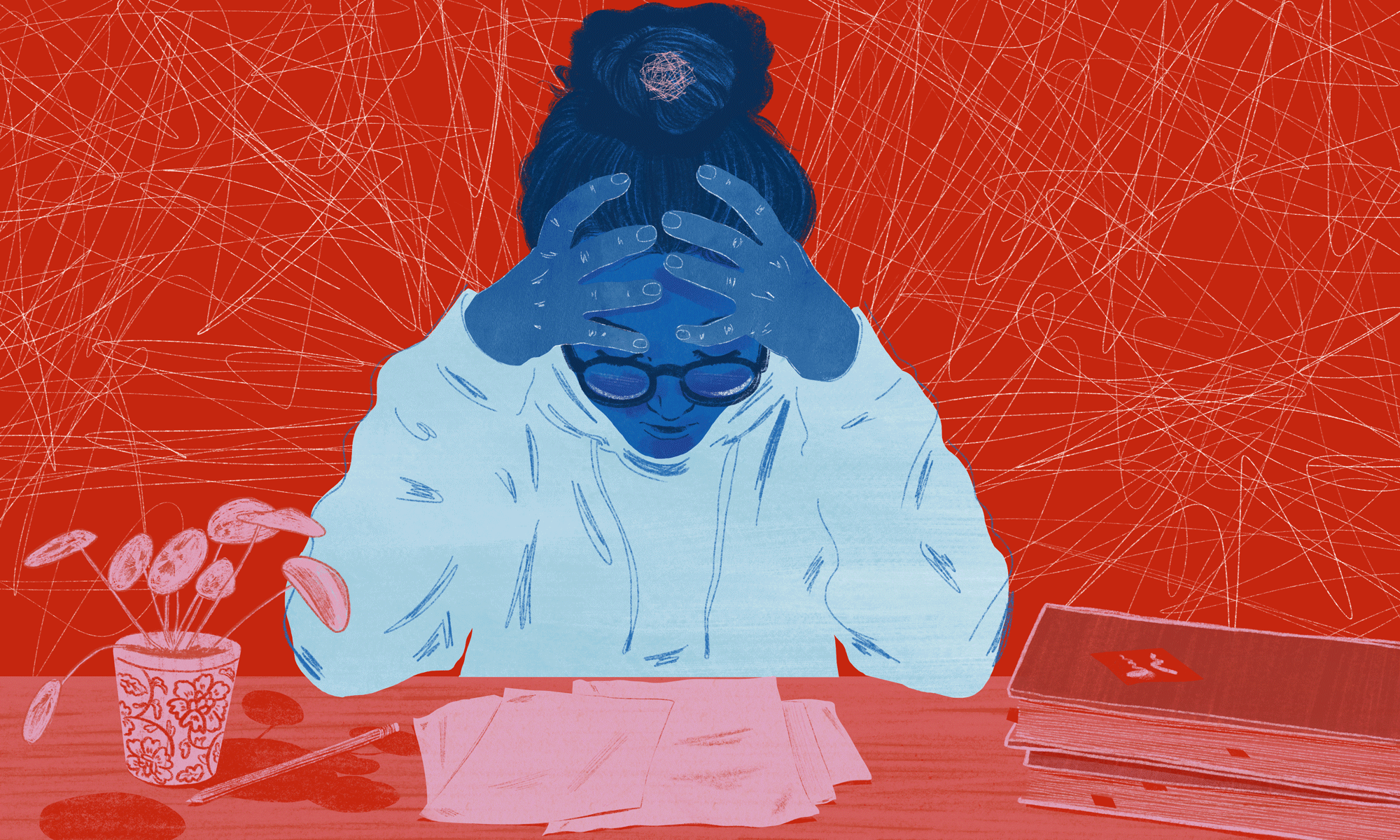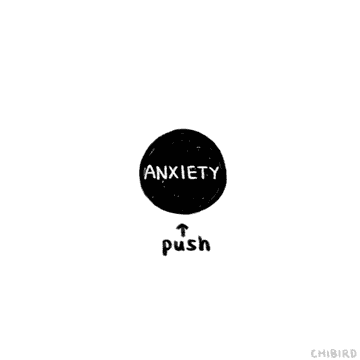We all feel anxious from time to time, but knowing when it’s become a real problem isn’t so black and white. If you’ve always thought of yourself as a rather ‘anxious person’ it might be time to address those feelings. No one should have to live in a constant state of worry, there are plenty of tips and support out there to help you feel yourself again.
Before we can diagnose ourselves with anxiety, we need to know what the symptoms are and if they're any different to the regular worries we all have on a daily basis.
1. Sense of impending doom
People with anxiety disorders are constantly on edge. They feel as though worrying about the future might protect them from whatever it is that they're concerned about actually happening. Often there isn’t a single thing causing the worry, it could be a general fear of things to come, but the worry can be triggered by certain events.

If someone has experienced past trauma, say an accident or bout of serious illness, they may do their very best to avoid that ever happening again. This could be a fear of driving following a crash or a fear of getting sick after unpleasant experiences as a child. By over-thinking about a certain situation, they may feel that they can be better prepared to avoid or tackle the issue when in reality, they are tormenting themselves with events that may never happen.
A person with generalised anxiety disorder will have intense feelings of impending doom. Despite there not being any singular reason for these feelings, it can be all-consuming. This fear goes hand in hand with a desperation not to lose control. As a result, people tend to avoid certain situations for fear of being faced with something that might trigger a panic attack (1).
2. Digestive issues
Studies have long suggested that there is a connection between the gut and brain. When we are anxious, we feel nauseous. This is often caused by an overproduction of adrenaline, the hormone used to jump start our flight or fight response. The release ends up in your stomach where it disrupts digestion and causes gastrointestinal discomfort such as nausea, stomach cramps and diarrhoea.
Anxiety and stress also have the ability to manipulate our gut bacteria and cause imbalances. In one study, they found that healthy individuals had reduced lactobacilli (good bacteria) in their gut during times of stress compared to other occasions when they were less stressed (2). Lactobacilli is a common bug found in most probiotics and without it, bad bacteria thrive causing inflammation and discomfort.
3. Shaking
People have tremors when they’re scared, why? The simple answer is that the body is preparing itself for action in the event of a threat. Experiencing stress prepares us to act, it’s an age-old behaviour inherited from our ancestors who needed to survive unpredictable events. How we cope with a certain stimulus depends on many factors but for anxious people, the reaction can often be somewhat severe.

On encountering a stressful situation, the body increases its production of adrenaline causing the body to prepare for action. The heart rate increases and muscles tense up hence why the body shakes. The body goes into overdrive trying to prepare you for the situation you’ve found yourself in. For people with anxiety, this can be triggered by situations one would normally not fear, such as social situations or enclosed spaces.
4. Heart palpitations
Cardiovascular issues are more likely to be present in people with anxiety (3). Repeated stress can take its toll on the heart and cause problems further down the line. A lot of heart issues present the same symptoms that are found in anxious individuals, such as chest pain, sweating and nausea.
 Anxiety Melting Essentials Pack - Learn More
Anxiety Melting Essentials Pack - Learn More
If you find yourself out of breath or your heart is fluttering without any real reason it could be a sign of something serious, or it could be simply anxiety. Always speak to your doctor if you have any concern.
5. Avoiding situations
Anxious people tend to avoid certain situations out of fear that they’ll be triggered. This becomes a real problem when people avoid healthy, every day situations like social gatherings and work. These avoidance behaviours don’t actually help with treating the anxiety, they simply tell the body that it will feel better if they avoid the trigger altogether.
Exposure therapy helps to address this issue by exposing the individual to the trigger (such as small spaces or driving) and providing them with techniques to manage a situation so that they fear it less with more exposure. It’s a vicious cycle but it can be broken with support and practice.
6. Dizziness
Although dizziness could mean a million other things, it can also be a symptom of anxiety. When we’re anxious, our blood pressure rises. A sudden change in pressure might make us feel lightheaded. If you’re experiencing regular dizziness, it might be wise to speak to your doctor to rule out anything more serious.
7. Increased breathing rate
When your body is in panic mode, your breathing increases as muscles demand more oxygen in preparation for action. When we’re anxious, our breathing tends to be more shallow and we can begin to hyperventilate. Breathing exercises can help to regulate our breathing and slow down our heart rate.
7. Difficulty falling asleep
Understandably, anxiety has been at an all-time high during the pandemic (4). Researchers found that anxiety during the pandemic greatly affected sleep quality, particularly in those who had to self-isolate (5). What is concerning is that sleep disturbances are also a risk factor for suicide. A lack of sleep prevents the body and mind from working well. Sleep disorders were also high in Italian nurses while the country was battling the worst of COVID-19 in 2020 (6).
High levels of anxiety mean the brain struggles to switch off. Not only is it difficult to fall asleep, but the quality of sleep is disrupted too. The lack of sleep causes further tiredness and even more anxiety meaning people end up trapped in a vicious circle of worry.
8. Feeling irritable
With being on edge comes feelings of irritability. An anxious person may tolerate less during times of stress. Their mind is so focused on protecting them from the trigger that anything else just gets in the way. Irritable people are more likely to snap, particularly after a poor night's sleep. If you’re feeling more irritable than usual, there may be something more to it.
9. Struggling to concentrate
The mind is working hard while worrying so other tasks don’t get prioritised. Have you ever wandered into a room and completely forgotten why you went in? That could be a sign of an anxious mind. Ever placed the kettle in the fridge and left the milk out? Another example that you could be preoccupied without even knowing it. Your brain can only handle so many tasks at once.
If you or someone you love is struggling with anxiety we recommend you click the link below to learn more about our Hypnotherapy Package.
Anxiety Melting Essentials Pack - Learn More

References
-
Muir-Cochrane, E., O’Kane, D., & Harrison, K. (2017). The person who experiences anxiety (pp. 215-224). Routledge
-
Deshpande, R. P., & Babu, P. P. (2019). Anxiety, Stress, and Neurological Dysfunction: From Basic Biology to Present Therapeutic Interventions. In Application of Biomedical Engineering in Neuroscience (pp. 401-413). Springer, Singapore.
-
Roest, A. M., Martens, E. J., de Jonge, P., & Denollet, J. (2010). Anxiety and risk of incident coronary heart disease: a meta-analysis. Journal of the American College of Cardiology, 56(1), 38-46.
-
Jia R, Ayling K, Chalder T, et alMental health in the UK during the COVID-19 pandemic: cross-sectional analyses from a community cohort studyBMJ Open 2020;10:e040620. doi: 10.1136/bmjopen-2020-040620
-
Sher, L. (2020). COVID-19, anxiety, sleep disturbances and suicide. Sleep medicine.
-
Simonetti, V., Durante, A., Ambrosca, R., Arcadi, P., Graziano, G., Pucciarelli, G., ... & Cicolini, G. (2021).
Anxiety, sleep disorders and self‐efficacy among nurses during COVID‐19 pandemic: A large cross‐sectional study. Journal of clinical nursing.








